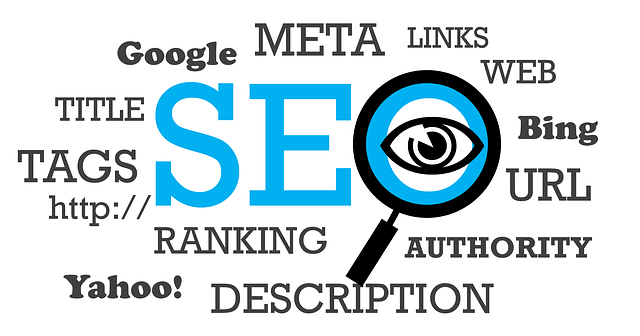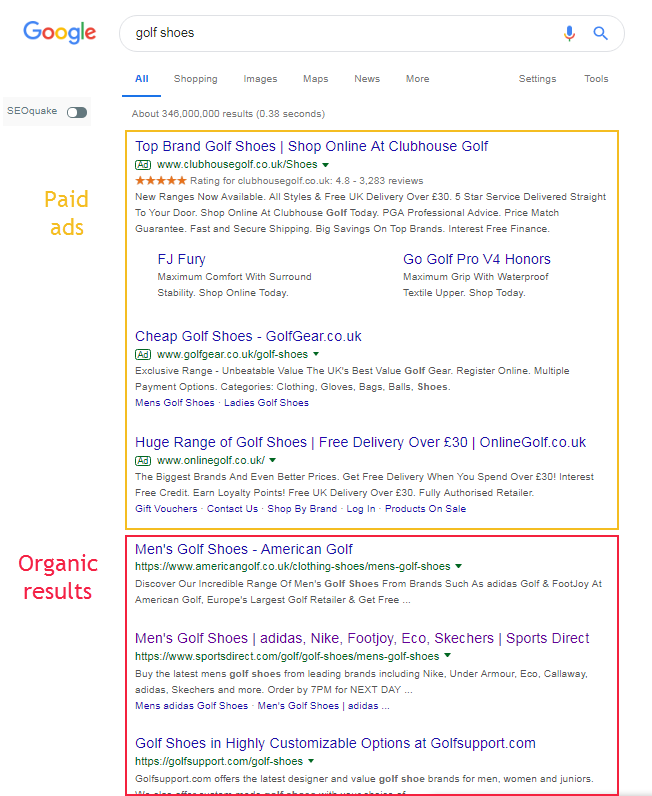Back in 2020, Google announced that they would be making User Experience (UX) more important…

So what is SEO ?
(Updated February 2022)
SEO, or Search Engine Optimisation to give it its full name, is actually a very complex subject. It has changed considerably over the last few years and is prone to many myths and misunderstandings.
Basically, Search Engine Optimisation (SEO) relates to what we call “organic” search and is all about making your website more visible to people who are using search engines to look for your company, products or services. The search engines return the most relevant “organic” results they can find in their indexes in response to the search query entered and display them on their search engine results pages (SERPs). The most relevant result is shown in position 1 (on page 1) with less relevant results below this, this is known as ranking.
Generally 10 organic results are shown below the top 3 paid ads on each page with another 3 paid ads at the bottom of the organic results. However, more recently, other items like maps, or short descriptions etc will also be included by the search engine depending on the topic and many other factors – that is a topic for a future post so we will ignore that for now.
Example of a most basic Google search engine results page (SERP) – top section of page only shown:

If your website is not indexed on Google (or other search engines), you will miss out on opportunities in which someone might have clicked through to your website, viewed your content, and bought your product or services.
By optimising your website for search engines, you can try and improve its position in search results, and thus be found more easily by potential customers and you can also create a better user experience. It is also important to remember that you are optimising for your visitors, not just for search engines.
SEO is an ongoing process in which you are continually making changes to your website and content in order to try and improve its visibility in search results. You should always be aiming to give users and search engines the best possible result for every relevant search query. To achieve this, it is important to provide good quality, unique content and a search friendly website that works well on any device (e.g. desktop, laptop, tablet or mobile phone). Users today often make use of a number of different devices in their searches when researching a topic or product so it is essential they can access your content on any device.
Search engines these days use mobile rather than desktop results to create their indexes so it is even more important to ensure that your website works well on all devices. Your mobile and desktop website versions should ideally display the same content rather than having separate website versions. This is generally achieved by use of “responsive design” which allows the same design to dynamically adapt to different screen sizes.
Here in the UK, Google has more than 92% of the Search Engine Market Share (February 2022) so this is obviously the main search engine you need to concetrate on. Industry reports suggest that Google uses around 200 different factors to determine the relevance of a website to a search query including:
- The website’s content
- The website’s structure and internal links
- The searcher’s geographical location
- Mobile optimisation
- Page loading times
- Social signals (links from social networks)
Search Engine Optimisation (SEO) is a complex process. It takes time to get results and, like any marketing, is a trial and error process without any guarantees of success. Data analysis and keyword (or key terms) research associated with SEO can take considerable time. It is essential, as with any other form of marketing, that you collect data so you can see how your optimisation efforts are performing. Google Analytics is commonly used for this.
Success in ranking well will also depend on many other factors such as how much competition you have, if they are near to you, how good their marketing and SEO is etc. If they have large marketing budgets and are very active with their marketing it obviously makes your job harder.
The main difference with organic search compared to paid search (pay-per-click or PPC) is that although it can take some time to get results, they tend to stay in the search results longer whereas with paid search they disappear immediately when you stop paying.
Your website needs to be built correctly in order to ensure it is search engine friendly so that search engines can easily access it and index the site pages. Good SEO (“white hat”) follows strict industry guidelines, adopting bad SEO or “black hat” techniques to try and fool search engines leads very rapidly to severe penalties being imposed. Some such penalties can take a very long time to recover from.
SEO has changed quite considerably over the last few years and there are many old outdated myths floating around. The basic principle however hasn’t really changed and is still that you need a good amount of good quality, unique content that is relevant to what is being searched for.
I hope that helps to clarify what SEO is without being too confusing.

